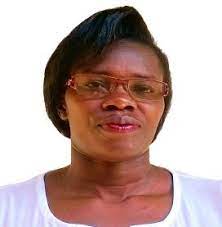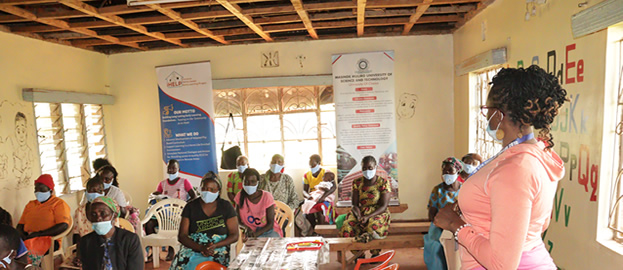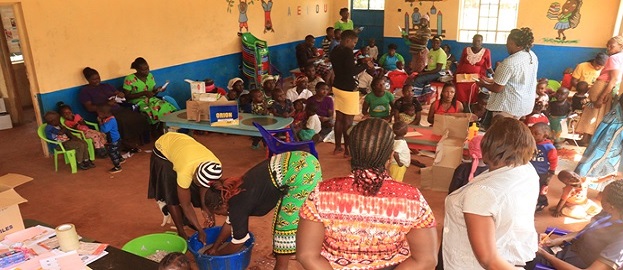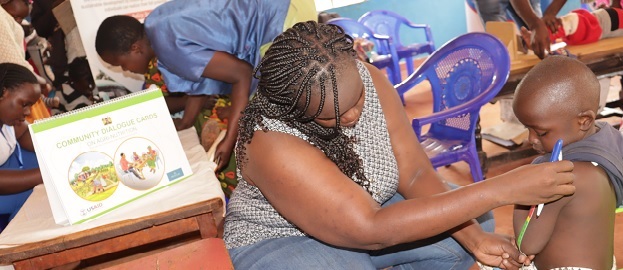MMUST iHELP PROJECT

Collaborators
Project Principal Investigator
MMUST’s Inclusive Home-Based Early Learning Project (iHELP)
About the Project
MMUST in collaboration with International Development Research Center, Canada have launched a pilot project dubbed dubbed MMUST iHELP in Ikolomani, Kakamega County.
The project focuses in extreme poor areas where most children under 5 years are at risk of health issues and developmental problems.
The project addresses the following four components
- Readiness for School
- Quality Play Based for all
- Responsive and Nurturing Caregiving
- Strong capacity of actors for policy actions and active engagement as
Contact Details
email:ihelp@mmust.ac.ke
Inclusive Home-Based Early Learning (iHELP)
Inclusive Home Based Early Learning Project in Kakamega Kenya, is a community led Inclusive Home based Play based Model of Learning supported jointly by
International Development Research Centre (IDRC) and the Global Partnership for Education (GPE).
The Two -year pilot project seeks to in Increase Early Child Education and Care (ECEC) for Children in Marginalised and Rural families and Communities under the core principles of access relevance and inclusivity.
The Project runs in three countries, Uganda, Kenya and Zimbabwe. The project is Technically Supported by MMUST, Kyambogo University and University of Zimbabwe.
In Kenya, MMUST and the County Government of Kakamega is working with a number of agencies among them: Kenya Institute for Curriculum Development and Kenya Institute of Special Needs as well as other development partners such as who o¬fer technical expertise in development of Caregivers and Community Council manuals for the IHELP programming and capacity building activities .
IHELP seeks to generate policy driven evidence and build unique knowledge exchange platforms based on existing policies and curricula. It aims to advance quality , inclusive early care and stimulation for under 4 year olds. IHELP project recognizes parents families and communities as critical pillars in caregiving and as well that there is ever-expanding number of actors connected in collaborative initiatives and learning networks at national and county level but services for remotes villages in child care and stimulation are still scarce.
This curriculum will be adapted based on a triangulation of Montessori, Kindergarten models and other indigenous content including the Community Based Education Curriculum being used by Sense International (SI) in Uganda. ECCE Implementing partners will spearhead parental support.
Events and Activities
MMUST Scholar Dr. Rose Opiyo leads efforts to equip children’s caregivers with skills in the established iHELP Centers
MMUST researcher, Dr. Rose Opiyo, has once again taken the lead to equip child...
MMUST Prolific Researcher Dr. Rose Opiyo Champions for Sustanability of iHELP Project through Stakeholders’ Workshop
Masinde Muliro University of Science and Technology prolific researcher Dr. Rose Opiyo has championed for the sustainability of the Read More
MMUST'S IHELP Project Pi, Dr. Rose Opiyo Spearheads Training on Material Development at iHELP Centres in Ikolomani Sub-county
MMUST’s iHELP project Principal Investigator (PI), Dr. Rose Opiyo has spearheaded training on material development at iHELP centres in Ikolomani Sub-County. The training has been going on from 28th...
IHELP Project Principal Investigator Dr. Rose Opiyo embarks on Three Day Intensive Children Health Assessment visits In the established Ihelp Centres In Ikolomani Sub-county
Masinde Muliro University of Science and Technology Scholar Dr. Rose Opiyo, who is the Principal Investigator of the iHELP pr...
Inclusive Home Based Early Learning Project (IHELP) Stakeholders Workshop Bulletin Is Out!!!
The Directorate of Corporate Communications and Marketing (DCCM) is delighted to bring to you the Inclusive Home Based Early Learning Project (iHELP) Stakeholders Workshop Bulletin.




